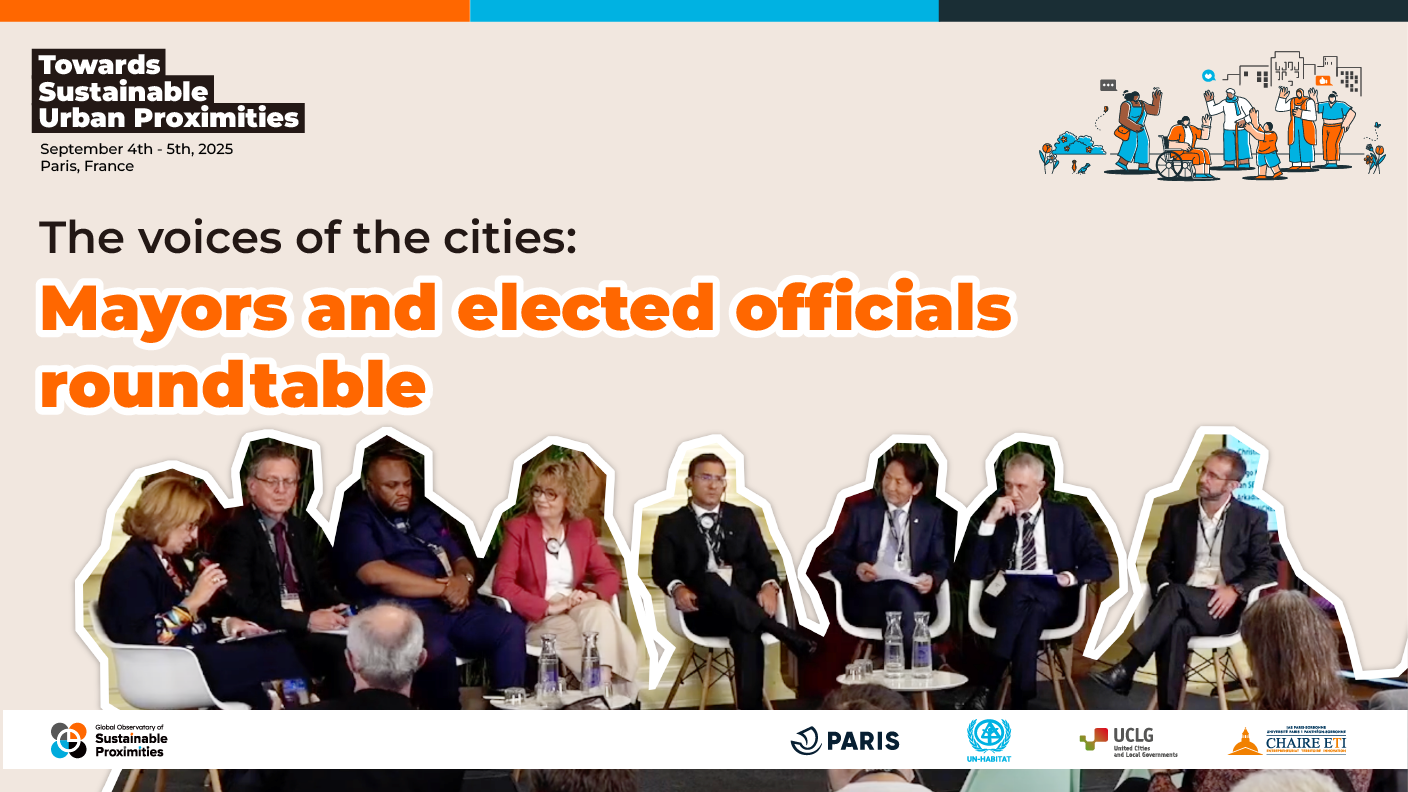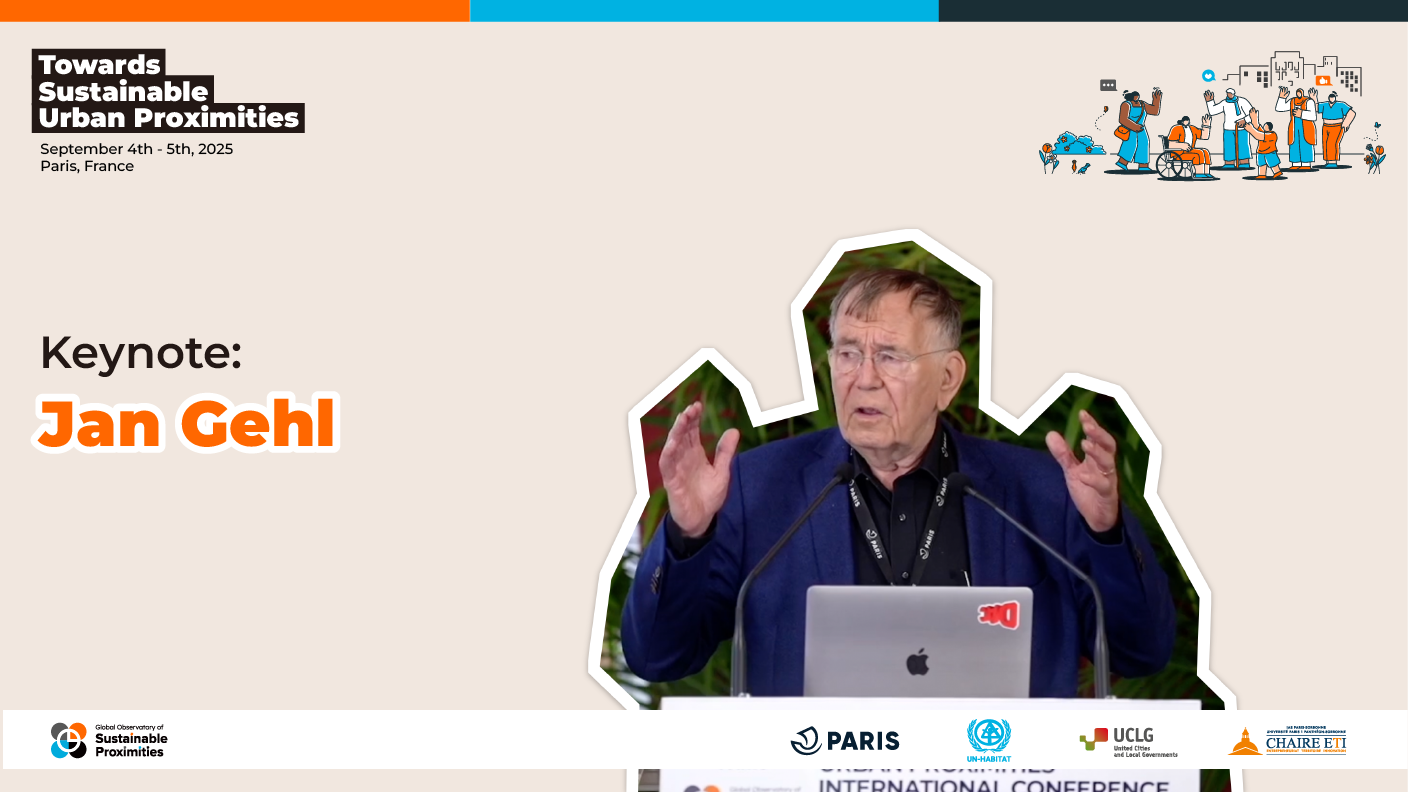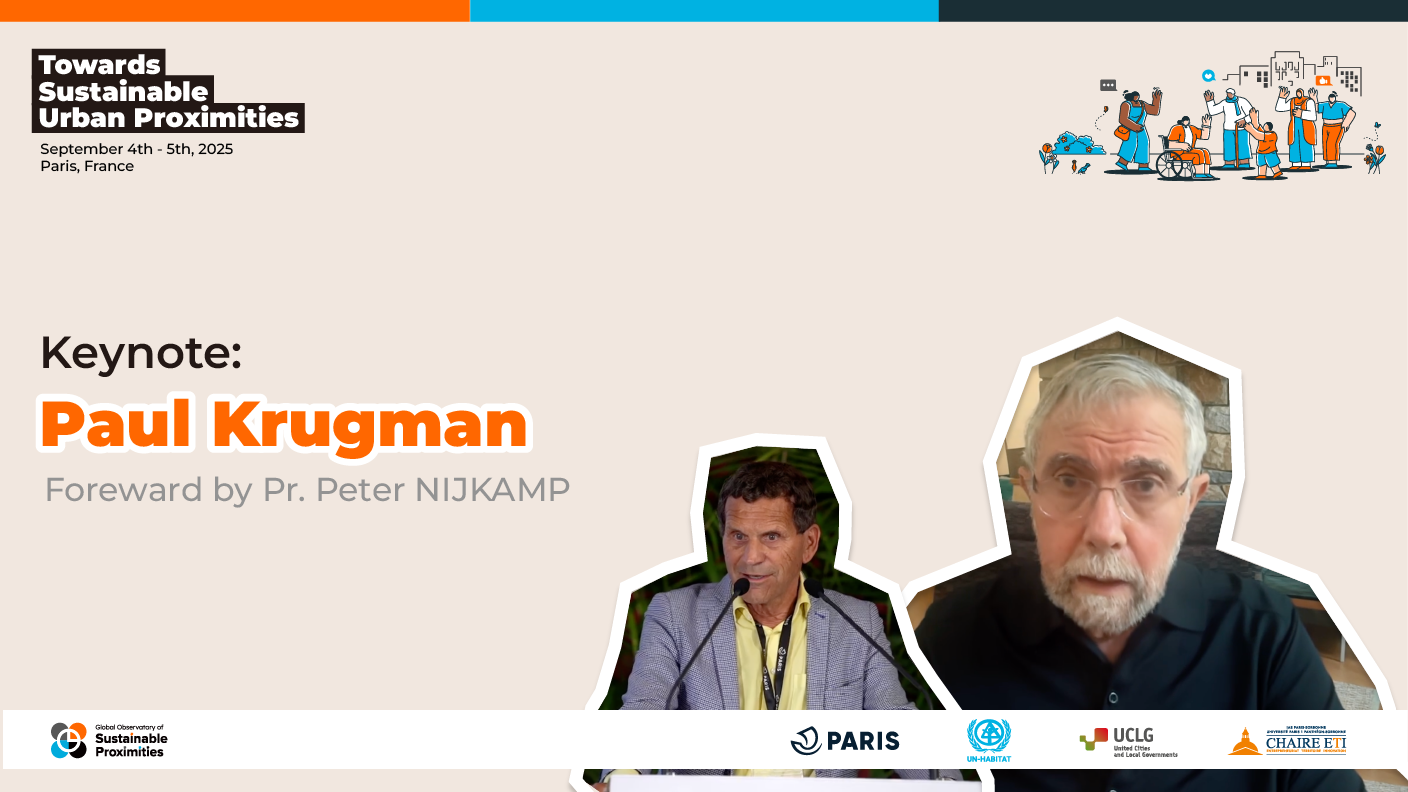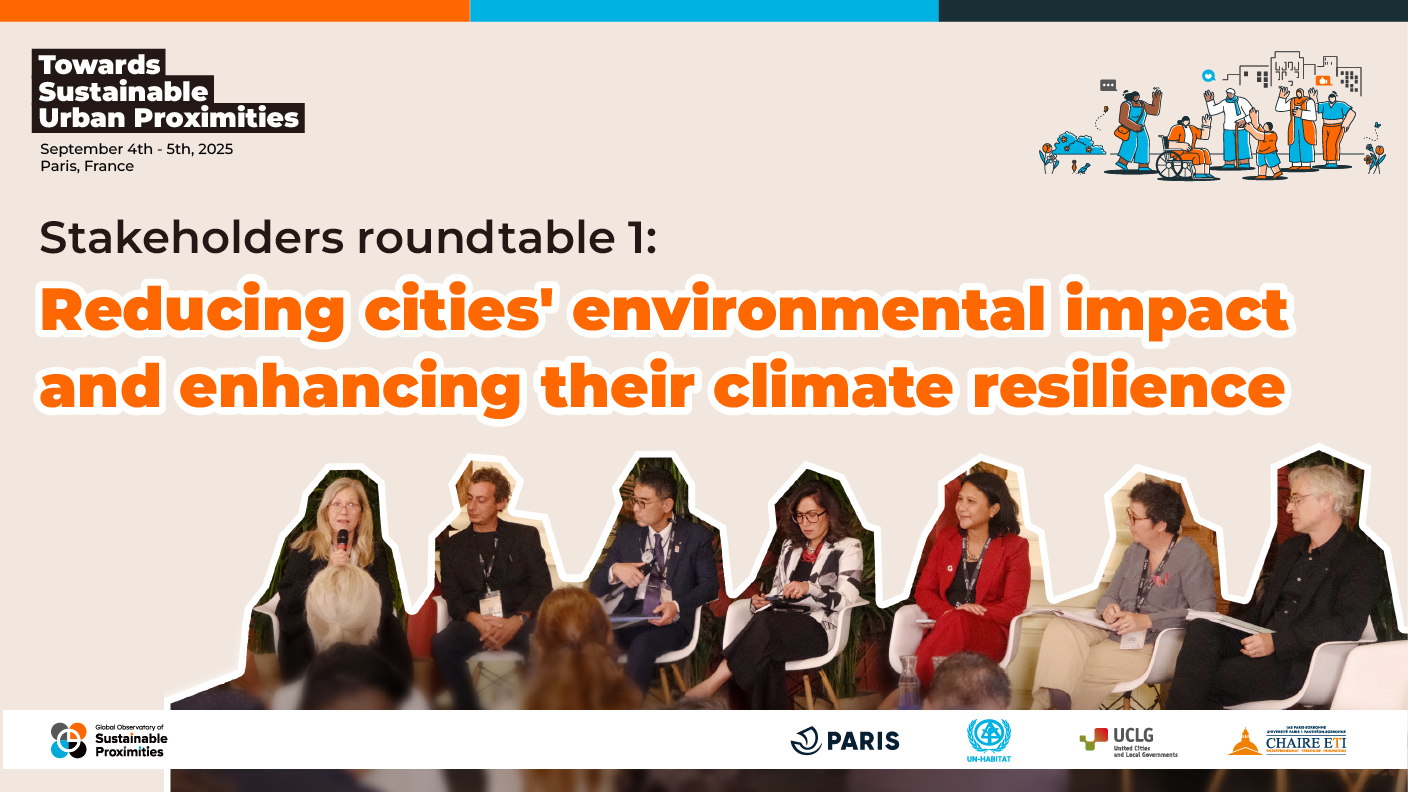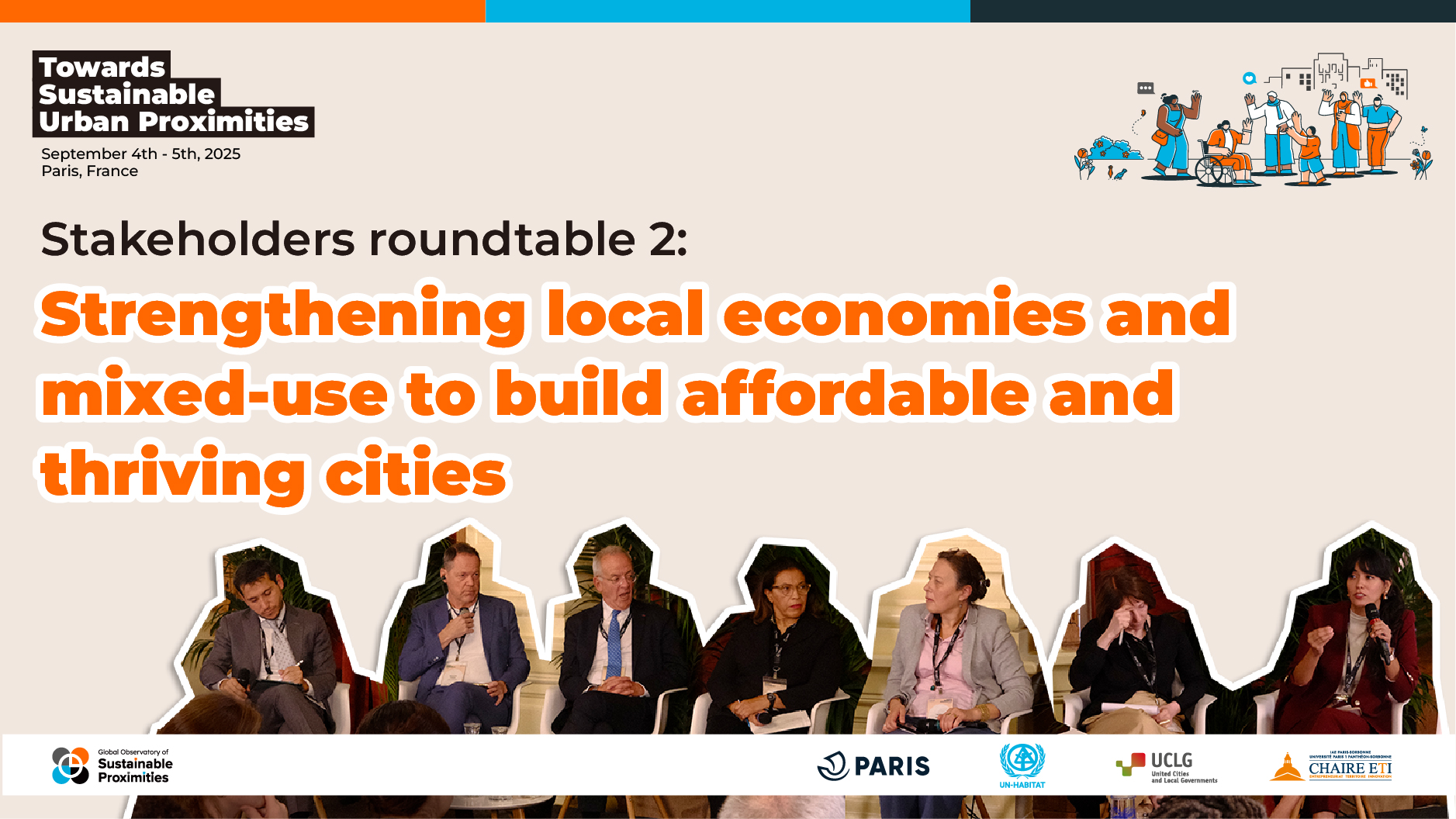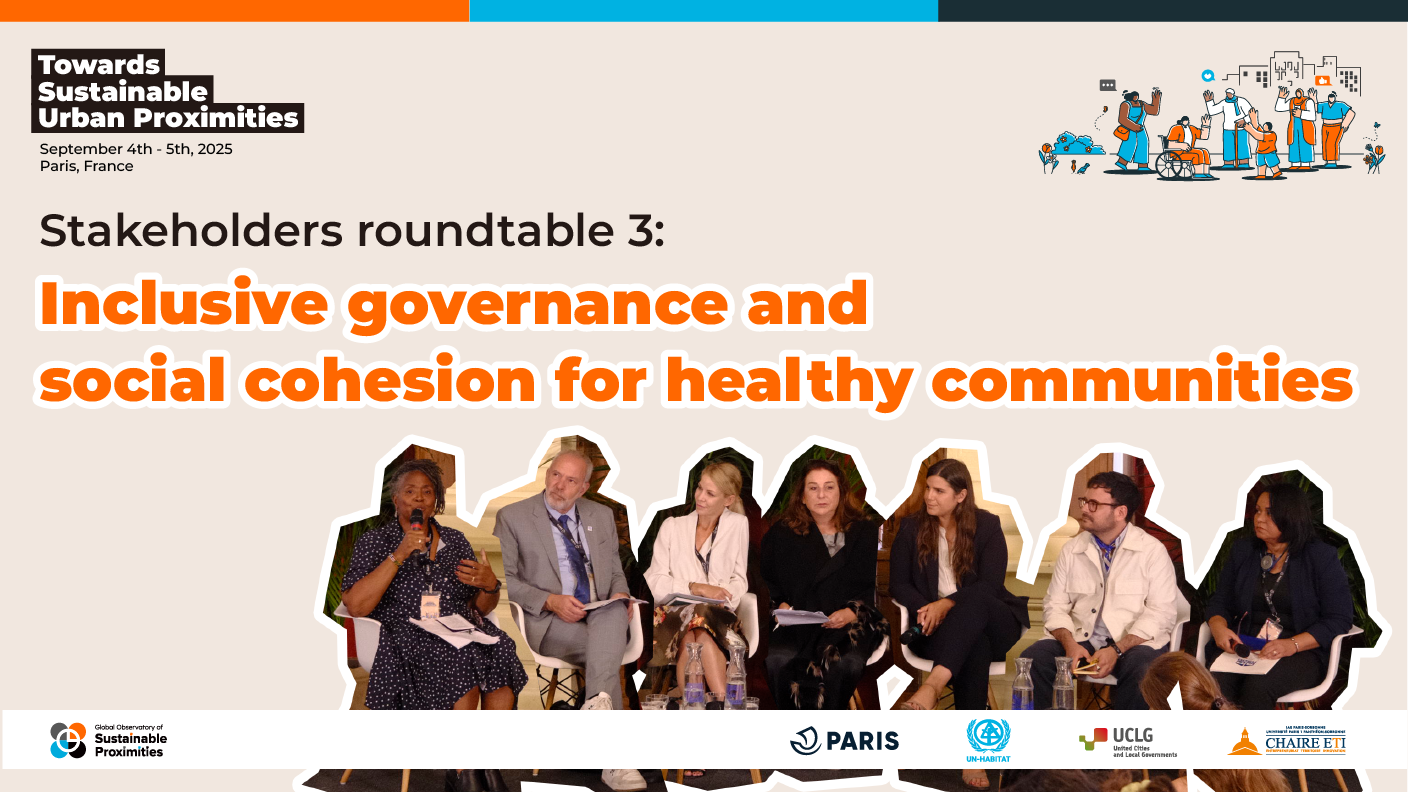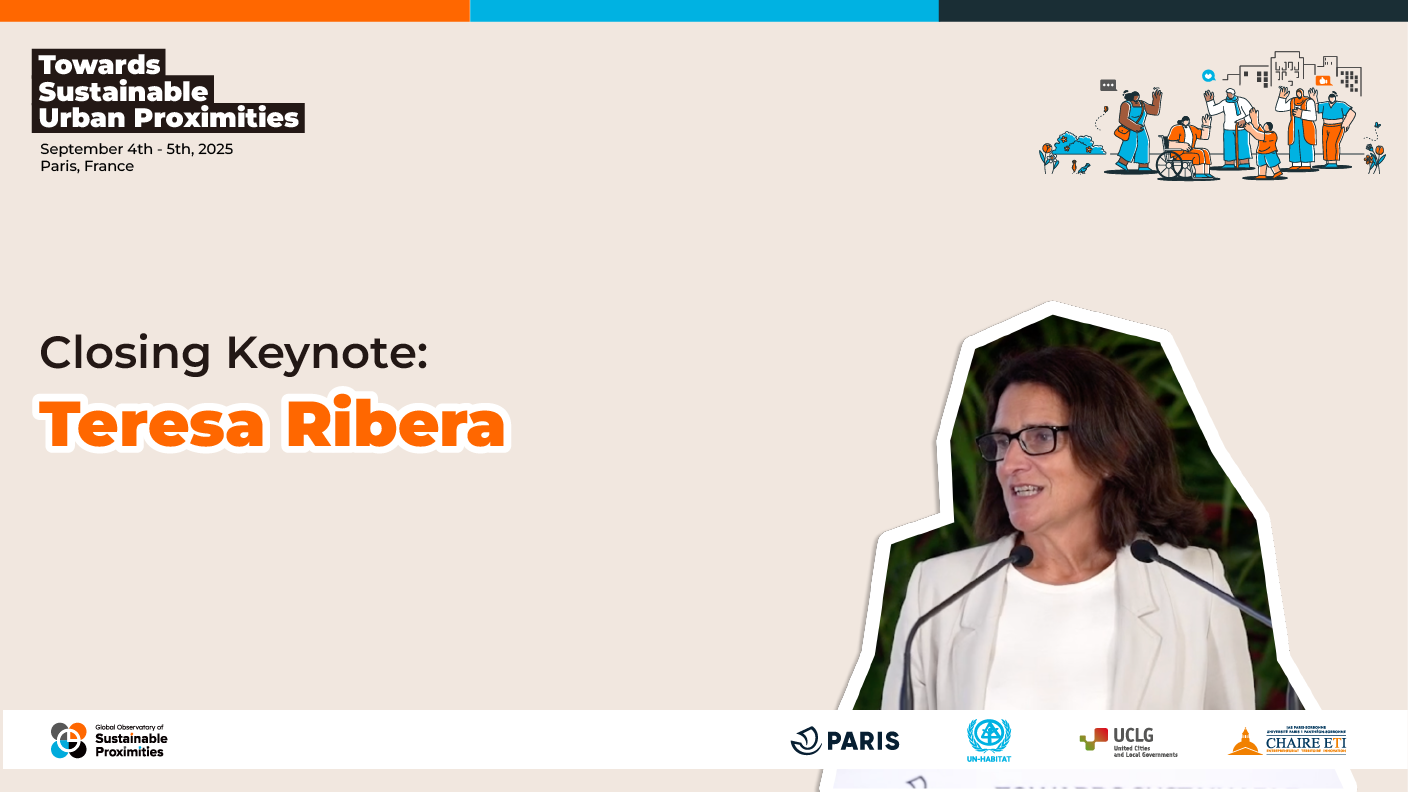Towards Sustainable Urban Proximities 2025
Paris Hosts Global Conference on Sustainable Urban Proximities
Ahead of 10th Paris Agreement Anniversary, Sept 4–5, 2025
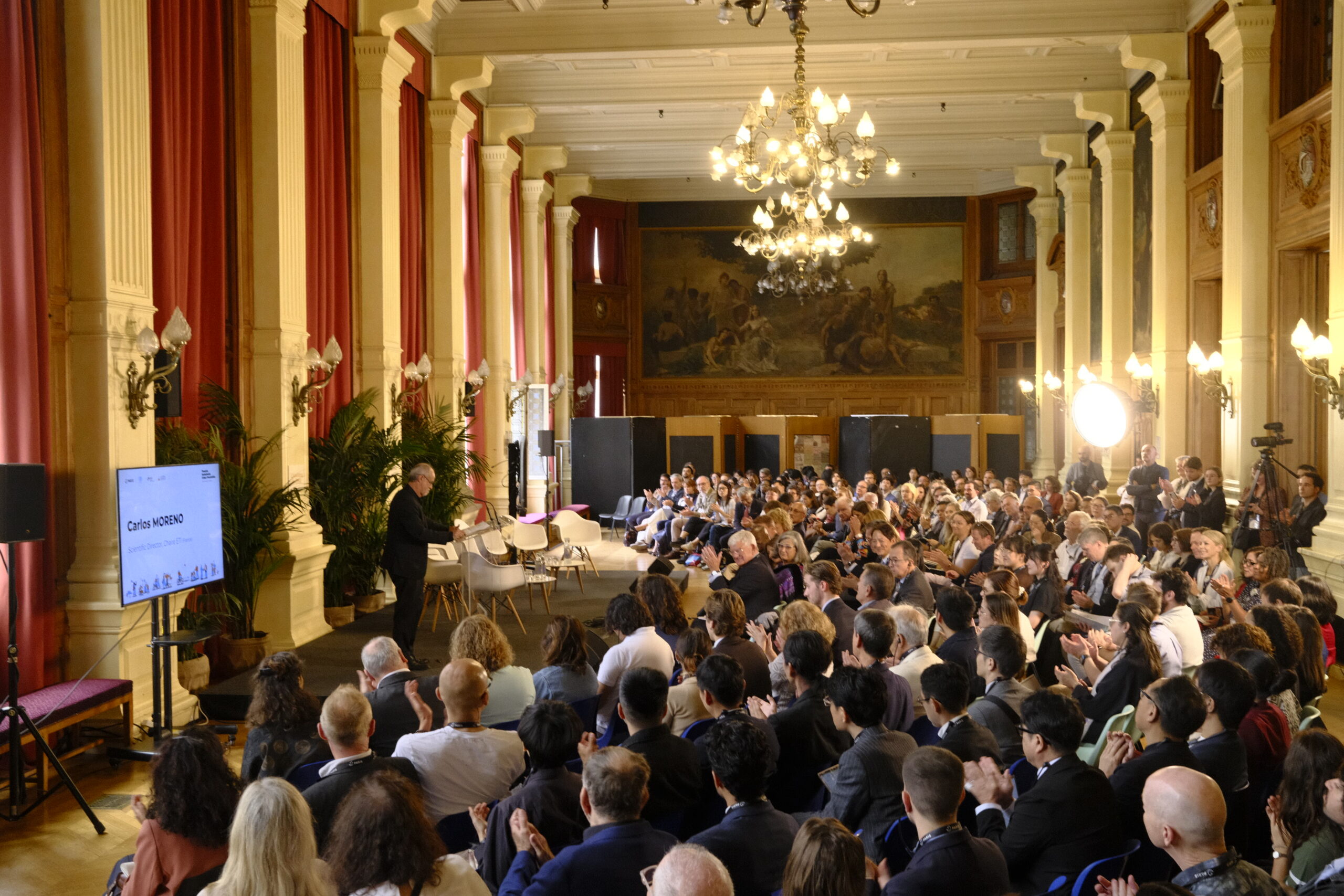
Co-organised by the City of Paris, UN-Habitat, United Cities and Local Governments (UCLG), and Chaire ETI at IAE Paris Sorbonne, and within the broader framework of the Global Observatory of Sustainable Proximities, Paris successfully hosted the “Towards Sustainable Urban Proximities” Conference on September 4–5 at the iconic venues of the Académie du Climat, Paris City Hall, and Paris 1 Pantheon Sorbonne University. The event marked a key milestone in the run-up to the 10th anniversary of the Paris Agreement on climate change.
The conference was hosted by the Mayor of Paris Anne Hidalgo and brought together local and regional governments from around the world, and features the participation of notable figures, including the Mayor of The Hague and President of UCLG Jan van Zanen, as well as Mayors and local representatives from over 20 cities. The Executive Director of UN-Habitat Anacláudia Rossbach, Scientific director of Chaire ETI Pr. Carlos Moreno, and representatives from the European Union including Vice-President Teresa Ribera and from the French Government Minister Delegate Thani Mohamed Soilihi, contributed to an insightful dialogue on strengthening governance of proximity from the bottom up, and advancing a renewed multilateral framework for sustainable urban futures.
The event convened partners and representatives from academia, international organisations, civil society, and the private sector, who collectively explored the concept of sustainable proximities and the partnerships necessary for enabling caring and inclusive cities. The conference served as a platform to present best practices, foster collaboration, exchange knowledge, and catalyse collective action. It launched a shared agenda for sustainable urban proximities, producing concrete outcomes and takeaways in the form of actionable key messages.
Over two days, local and regional leaders shared innovative experiences and discussed the challenges and lessons learned in promoting proximity-based urban models. The agenda featured ongoing and past efforts on the role of proximity in enabling adequate housing, sustainable mobility, access to essential services, climate adaptation, and greening strategies.
The urban proximity model, based on ensuring residents can meet essential needs — such as work, care, food, and recreation — within a short walk or bike ride from their home, was presented as a pathway toward spatial justice, sustainability, and community well-being. Rooted in the principle of proximity-based development, it calls for integrated planning that redistributes opportunities and reinforces care-based, climate-resilient communities. In the face of climate change, economic inequality, social exclusion, and a global housing crisis, the conference reaffirmed proximity as a powerful model for building resilient, connected, and inclusive urban environments that improve quality of life.
The outcome of the conference includes a set of key messages that will inform the development of a methodological guidance framework. Building on the exchanges held in Paris, this serves as a shared call to action outlining concrete steps for scaling up sustainable urban proximities through joint implementation, knowledge co-creation, and inclusive multilevel and multistakeholder governance.
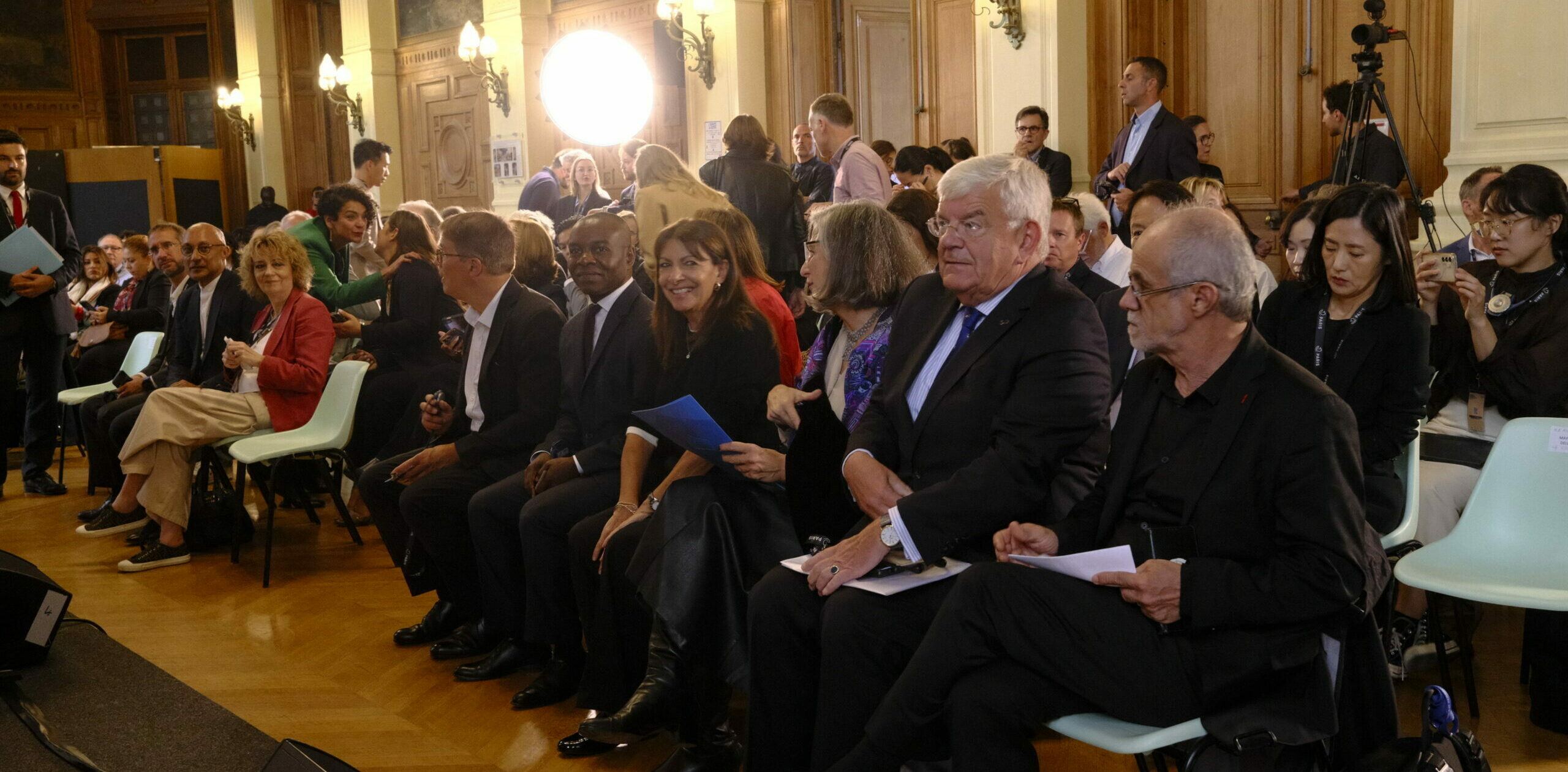
Alongside mayors, academics, representatives of international organizations, and associations, we are demonstrating how essential local actions are to successfully achieving the ecological and social transition. Proximity is the key! In Paris, we have created over 1,500 km of bike lanes, reduced car traffic, opened new parks and public facilities, and renovated housing. As a result, air pollution has been reduced by half over the past 20 years.
Urban proximity is not just a planning tool — it is a paradigm shift. It is about creating cities where people can live, work, learn, and thrive within their own neighbourhoods. At a time when nearly three billion people face housing inadequacy, it means ensuring that housing is not isolated, but integrated into vibrant, connected communities.
At a time of climate urgency and growing inequalities, proximity offers a hopeful model. By placing proximity into our strategies, we can reimagine our cities, and create spaces that are more sustainable, equitable, and care for our communities.
What was only an idea after COP21 has today become a global movement: sustainable proximity. It is not just about urban design – it is about dignity, solidarity, and quality of life. Together – researchers, mayors, entrepreneurs, and communities – we can turn this vision of the x-minute city into a global reality for the 21st century. This is our collective responsibility, and also our greatest opportunity to reinvent cities for people and for the planet.
For further information, please visit the website or contact info@sustainableproximities.org
About The Global Observatory of Sustainable Proximities: It is a go-to knowledge and capacity building platform collecting information about local initiatives while supporting and promoting urban proximities at a global scale. Proximity-based urban development—ensuring people can meet essential needs close to home—has proven to advance social, economic, and environmental sustainability. Launched at the 11th World Urban Forum in Katowice in 2022, it is co-led by the Entrepreneurship, Technology and Innovation Chair of the IAE Paris Sorbonne Business School (Chaire ETI), United Cities and Local Governments (UCLG) and the United Nations Human Settlements Programme (UN-Habitat) – have jointly developed a globally applicable concept based on proximity, official measures and indicators, a global centre for knowledge sharing and capacity building, and a global alliance of academic scholars to support implementation.
About Chaire ETI IAE Paris-Sorbonne Paris 1 Panthéon-Sorbonne University has more than 60 years of experience in innovation. Chaire ETI’s goal is to develop and diffuse recent and innovative ideas shared by their researchers and associated partners around the territory, so they become a key for today’s economically, ecologically and socially sustainable value chain. The work output is proposed in different formats by our researchers (written, visual or video), so it can be accessible for everyone. We want to pass our knowledge to all practitioners who are involved in their scientific work and make it more useful in the development of our cities, territories and in our own lives.
About UCLG United Cities and Local Governments – UCLG, as a global network of cities and local, regional, and metropolitan governments and their associations, is committed to representing, defending, and amplifying the voices of local and regional governments to leave no-one and no place behind. Together we are the sentinels of the hopes, dreams, and aspirations held by individuals in communities around the world searching for a life in which the ideals of the SDGs are a lived reality.
About the United Nations Human Settlements Programme (UN-Habitat) UN-Habitat is the United Nations entity responsible for sustainable urbanisation. It has programmes in over 90 countries supporting policymakers and communities to create socially and environmentally sustainable cities and towns. UN-Habitat promotes transformative change in cities through knowledge, policy advice, technical assistance, and collaborative action. To know more, visit unhabitat.org or follow us on social media @UNHABITAT.
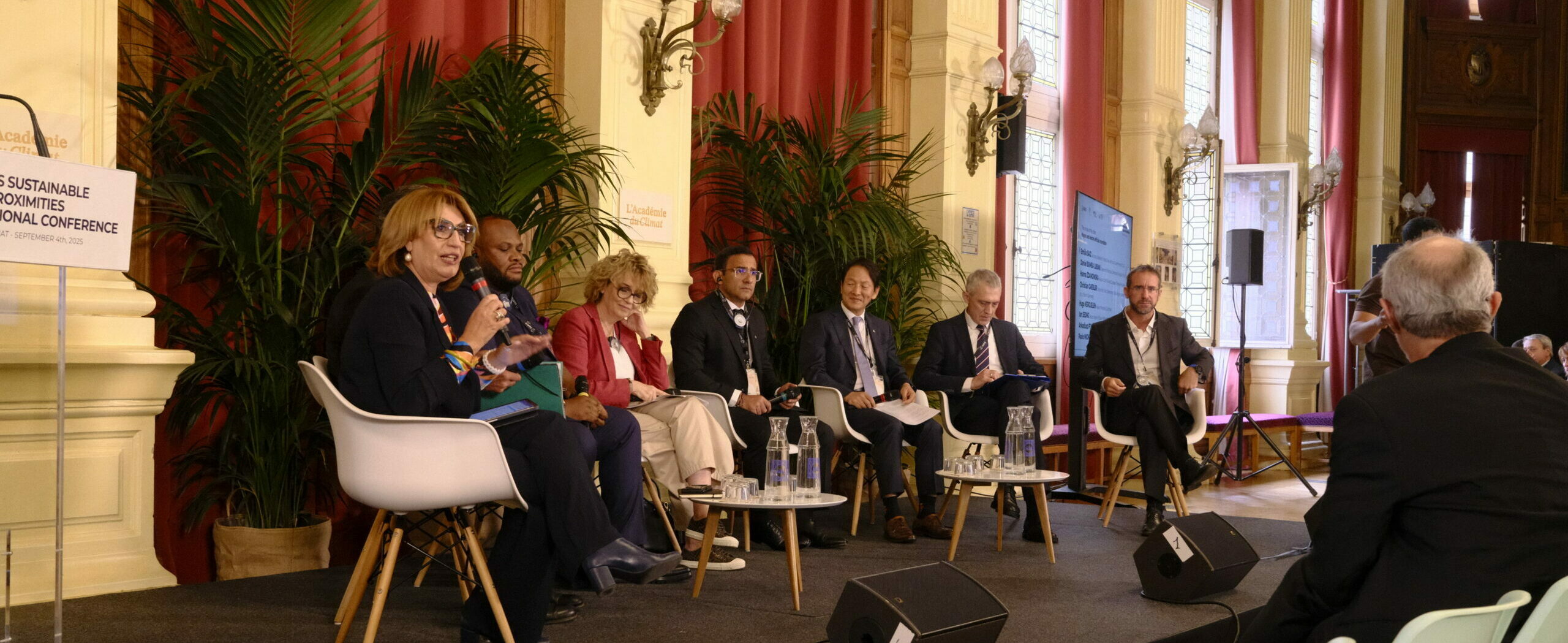
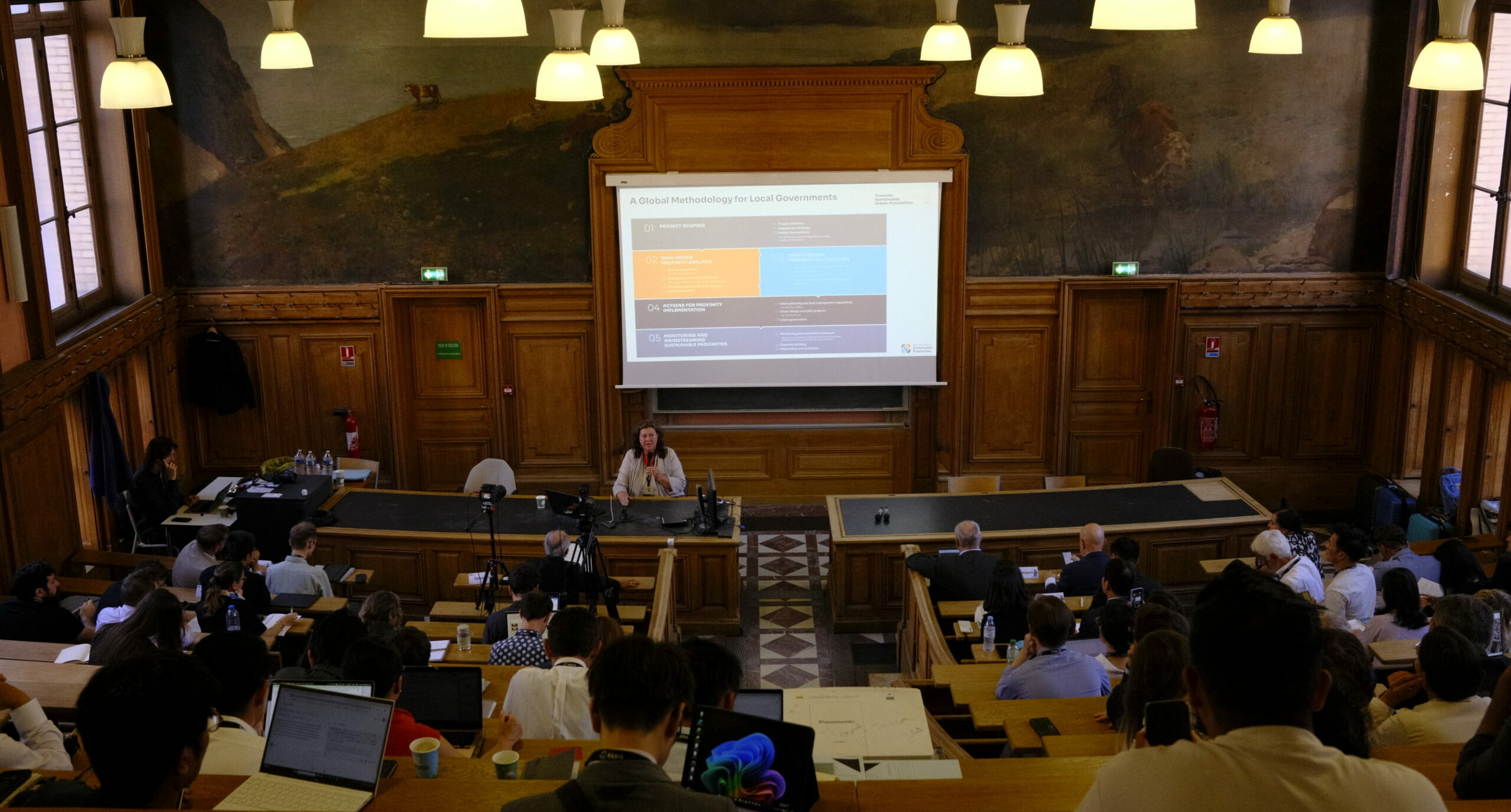
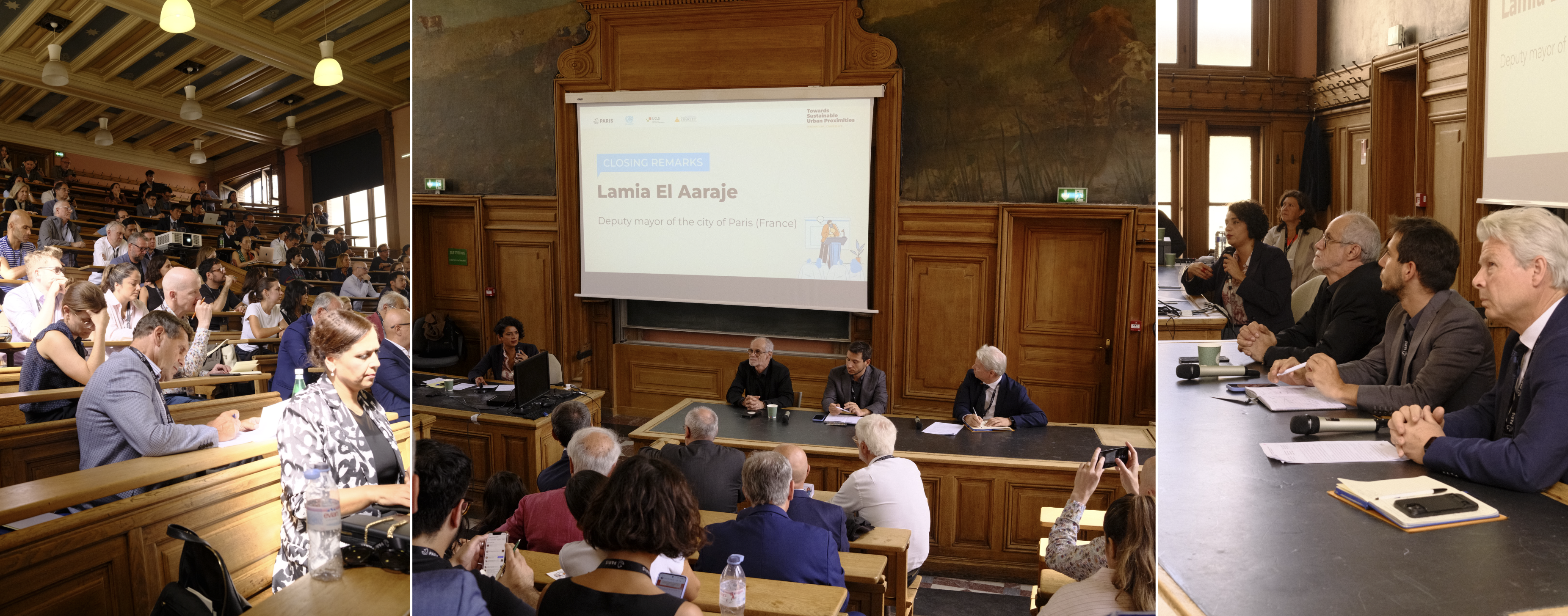
Watch The Conference Sessions
Anne Hidalgo Mayor of Paris (France)
Anacláudia Rossbach Executive Director of the United Nations Human Settlements Programme (UN-Habitat)
Jan Van Zanen President of United Cities and Local Governments (UCLG)
Carlos Moreno Scientific Director at Chaire ETI (France)
Thani Mohamed-Soilihi Minister delegate for international partnerships and Francophonie (France)
The voices of the cities: Mayors and elected officials roundtable
Cities representatives exchange on urban proximities and best practices
Emilia Saiz Secretary General of United Cities and Local Governments (UCLG)
Daniel Bumba Lubaki Governor of Kinshasa (Democratic Republic of the Congo)
Hanna Zdanowska Mayor of Łódź (Poland), European Climate Pact Ambassador
Hugo Kerguelen Mayor of Monteria (Colombia)
Ian Seong Deputy Mayor of Busan Metropolitan City (South Korea)
Christian Gaebler Senator for Urban Development, Building and Housing of the city of Berlin (Germany)
Arkadiusz Ptak Mayor of Pleszew (Poland)
Paolo Micheli Mayor of Segrate (Italy)
Paul Krugman Nobel Prize for Economy (video message)
Foreward by Pr. Peter NIJKAMP, VU University, Amsterdam (the Netherlands)
[Stakeholders Roundtable 1]
Reducing cities’ environmental impact and enhancing their climate resilience
Martha Thorne Former executive director of the Pritzker Architecture Prize and currently Director at Gallery Institute (Spain)
Takashi Terakawa General Director of Public Works Bureau of Osaka City Government (Japan)
Alexandre Labasse Architect and General Director of APUR (France)
Maria Buhigas Chief Architect of the city of Barcelona (Spain)
Reggie Ramos Executive Director of Transportation for Massachusetts (USA)
Sharon Gil Program management officer at UNEP
Andrea Gorrini Director of Fondazione Transform Transport (Italy)
[Stakeholders Roundtable 2]
Reducing cities’ environmental impact and enhancing their climate resilience
Albert Lladò Head of Policy of United Cities and Local Governments (UCLG)
Gérard Wolf Special advisor to the French Minister for Europe and Foreign Affairs for sustainable cities
Guadalupe Giselle Zavala Ojeda Director of Urban Regulations and Land Management at San Luis Potosí (Mexico)
Aida Robbana Country programme manager of UN-Habitat Tunisia Country Office
Amina Bécheur Professor at University Gustave Eiffel (France)
Giordana Ferri General Director at Fondazione Housing Sociale (Italy)
Hendrik Tieben Professor & Associate Director at Chinese University of Hong Kong (China)
[Stakeholders Roundtable 3]
Reducing cities’ environmental impact and enhancing their climate resilience
Michelle Thompson Associate Professor at University of New Orleans (USA)
Anouch Toranian Deputy Mayor of Paris (France)
Rania Hedeya Head of UN-Habitat Regional Office in Arab States (Egypt)
Frédéric Vallier General Delegate at AIMF (France)
Anna Köning Jerlmyr CEO of Arwidsson Foundation (Sweden)
Ramon Marrades Director of Placemaking Europe
Adalgisa CASTILLO Director of Santo Domingo Oeste (Dominican Republic)
Teresa Ribera First Executive Vice-President of the European Commission for a Clean, Just and Competitive Transition

Building global capacity for sustainable proximities
Opening session and Launch of the Global Methodology for Sustainable Proximities
Catherine Gall Executive Director at Chaire ETI (France)

Opening remarks
Introduction of the academic segment
Carlos Moreno Scientific Director at Chaire ETI (France)

Inaugural lecture
Ezio Manzini Honorary Professor at Politecnico of Milan (Italy)

The scientifc field of Urban Proximities
Renowned academics and researchers from around the world diving into the impact of Proximities as a powerfull integratic cross-cutting scientific framework to empower urban transformations
Catherine Gall Executive Director at Chaire ETI (France)
Li Wan Professor at Cambridge University (UK)
Giselle Sebag Executive Director, International Society for Urban Health
Giuseppe Cappochin Member of National Council of Italian Architect, Planners, Landscapers and Conservators (CNAPPC – Italy)
André Torre Professor at University Paris-Saclay (France)
Benjamin Büttner Chair of Urban Structure and Transport Planning at Technology University in Munich (Germany)
Rossana Valdivia Pallares Professor at Tecnologico of Monterrey (Mexico)
Ian Seong Deputy Mayor of Busan Metropolitan City (South Korea)
Karima Kourtit Lecturer at Open University Rotterdam (the Netherlands)
Sunil Dubey Professor at Institute for Cities Sydney (Australia)

Innovative solutions for Sustainable Proximities 1
PRINCIPLES : What is proximity?
Albert Lladò Head of Policy at United Cities Local Governments (UCLG)
Catherine Gall Executive Director at Chaire ETI (France)
Alexandre Granié CEO at Cartosphère (France)
Andrew Schmidt Senior Policy Analyst at UN-Habitat
Seunghoon Han City designer at Chaire ETI (France)

Innovative solutions for Sustainable Proximities 2
INDICATORS : How do you measure it?
Chiara Martinuzzi Research Project Manager at Chaire ETI (France)
Kader Makhlouf Special Advisor to the Secretary General at UCLG
Aline Matta Programme Management Officer at UNITAC
Fanny Rabu Manager Consulting Services at Inetum (France)
Jon Aguirre-Such Cities Countdown to 2030 coordinator at UCLG

Innovative solutions for Sustainable Proximities 3
PARTICIPATORY TOOLS : How do you implement it?
Alina Koschmieder Climate Change and Environmental Expert at UN-Habitat
Jose Chong Programme Management Officer at UN-Habitat
Victoria Escobar Board Member of Shared City Foundation (Sweden)
Anna König Jelmyr CEO at Arwidsson Foundation (Sweden)
Alice Constant Gender Equality project manager at City of Paris (France)

Closing session
The conference will conclude with key messages from the various sessions and ideas for next steps for advancing urban proximities
Lamia El Aaraje Deputy Mayor of Paris
Raf Tuts Director of the Global Solutions Division at UN-Habitat
Albert Lladò Head of Policy at United Cities Local Goverment (UCLG)
Carlos Moreno Scientific Director at Chaire ETI (France)


